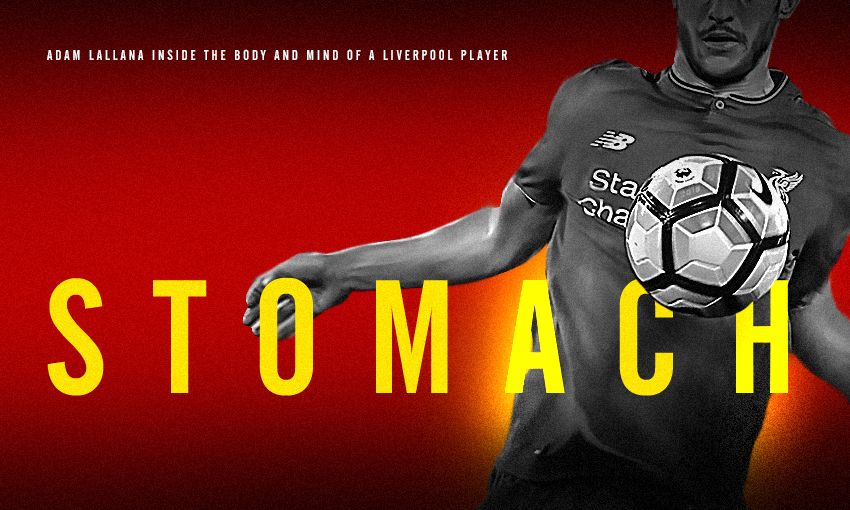Adam Lallana: Inside the body and mind of a Liverpool player - the stomach
Nutrition within football has taken on greater importance as sports science has developed over the years. Here, Adam outlines the typical diet of a top-level player and its impact on performance...
“I can’t stress enough how important nutrition is in football…”
Again, looking back to the two games in 44 hours at the turn of the year, we literally got into the dressing room after the City game and had a plate of pasta – probably the last thing in the world you wanted to do is eat because you had no appetite coming in after the game, but it was about getting it into you with another game 44 hours later. Getting home, I ate another big plate of pasta and some meat. It was a bit easier to eat then because it was a couple of hours after the game, but even though it was 10.30 at night, it was still important to get it into your system. The next day, it was about eating all day, as often and as much as possible really. I think I woke up about 7.45am and had toast in bed. Then I went downstairs and about 10 o’clock, I had some Weetabix with banana. At midday, my old man was up at my house so he made bacon and egg sandwiches in a bap, so I had two of them. I got into training at 3pm for recovery and had a yoghurt and a Ryvita-type bread with chicken on and another shake. We did recovery and then after that, I had pasta, chicken and veg. We travelled to Sunderland, got there about 8.30pm at night and there was a big sandwich station set up for us – so I had two big sandwiches, packed with meat, and a yoghurt. Then the next day, on the morning of the game, you eat as much as you can. Replenishing everything you’ve lost is so vitally important. Nutrition is focused upon a lot more these days in football, but rightly so because there is evidence out there to show it helps you recover and helps your muscles recover. When you’re doing what we did and going again in the space of 44 hours, it is so important you get as much into you as possible.
“Mona Nemmer has been a brilliant addition to the backroom team…”
She’s had a massive impact – and she’s great around the place as well. If you fancy something different, she has loads of different recipes for us to try. It’s her industry, she is a qualified nutritionist and a trained chef. She is absolutely brilliant and the quality of food has definitely, definitely gone up a couple of levels since the summer.
“It seems obvious, but being properly hydrated is so important…”
Fluids work alongside nutrition; they both go hand-in-hand. It’s important to be hydrated all the time and we have different supplements and drinks pre-match, different electrolytes. Shakes after games are very fruit-based, we have smoothies with proteins in them. Right now, I am drinking an electrolyte drink that’s been warmed up after training because it was freezing outside! We listen to people who give us the advice; on the nutrition side, whatever Mona tells me to do or tells me to eat and drink, I’ll do it; whatever the manager tells us tactically or whatever, we’ll do it; whatever the strength and conditioning coaches, or whatever Andreas [Kornmayer] tells us to do in the gym or in pre-season, we’ll do it. The manager has brought these people in to help us and to help him – he has succeeded in the past, so if we listen to him and who he has brought in to help us, then it’s only going to help us do well in turn.
“You can take food home from Melwood, but I try not to be too regimented…”
It’s important to know that if you fancy a chocolate bar every once in a while, it doesn’t harm you – especially if you’re playing regularly! My wife cooks at home and we try to eat together as a family as much as we can. There is food on offer for you to take home, as well as supplements, whatever you want really.


